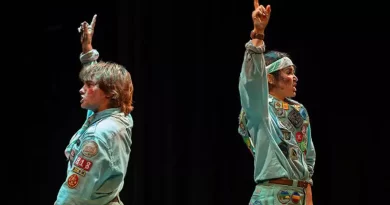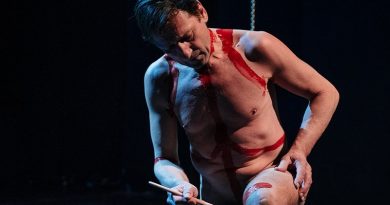“The Ballad of Hattie and James” at Kiln Theatre
Simon Jenner in north London
19 April 2024
A woman sits and plays the piano at St Pancras International Station in 2019. A man, James, catches his breath and someone’s clip goes viral. By April 2024 she’s playing in the Royal Albert Hall. But James’s gasp goes back to 1966 and for 20 years he has not spoken to her. Samuel Adamson’s The Ballad of Hattie and James opens at Kiln Theatre directed by Richard Twyman until 18 May.

Photo credit: Mark Senior.
Hattie’s a prodigy, at 63. It’s an interrupted prodigiousness. “Do you want to pay primo or secondo, James,” she asks him when they meet properly over rehearsing Britten’s Noye’s Fludde in 1976. Hattie’s always primo: it helps that her mother inherited a 1910 Bechstein piano, which also threads its way through the next 60-odd years.
Featuring an enchanting score by Nicola T. Chang and David Shrubsole, and on-stage piano played by Berrak Dyer on this occasion, the play distils to three modes. It’s served by Jon Bausor’s elegantly stripped revolve set, that spins time away and almost functions as time regained, as actors too in Anjali Mehra’s movement set out on a musical carousel of their lives. Simisola Majekodunmi’s lighting lends a haze of timelessness.
First, protagonists Hattie (Sophie Thompson) and James (Charles Edwards) are hardly offstage, and give phenomenal performances, particularly Thompson. They are sometimes joined by the strong presence of Suzette Llewellyn in nearly every other role, and occasionally James’s half-sister Chrissie (Luna Valentine on this occasion), opening out their dynamic. Finally, Dyer’s performances punctuate the often frenetic, intimate, and musically peppered dialogue, as Thompson leans over her, platonically riffing.
The music is essential, given an ideal bloom in Pete Malkin’s sound design. It lends both heart and lungs to the production, distils the sometimes remote, self-involved dialogue into a breathing space, an affect. It radiates warmth round the play where love seeps through what is unsaid but can be uttered by Hattie or James when they write and rewrite for each other.
And there – in moments of who wrote what and when – curls the nub of discord, the fractured harmony of their love. They’re both gay and it takes Hattie to tell James that. Conversely no partner remotely has what they have with each other; or shapes them as much as they damage and inspire each other.
Adamson’s whirligig of time hurtles them round from 1976 to 2020 to 1999, 1978, 2024, 1978, 2039, and 1966 – much like the revolve set serving as uncluttered metaphor for the occasionally cluttered but often brilliant language. Dan Light’s video dates arrive slowly, deliberately allowing scenes to focus before popping up dates (sometimes a countdown).
The dialogue is as precocious as Hattie, in the 1976 section too precious. In 1976 it’s certainly not impossible a 16-year-old British feminist might paraphrase French discourse, but Adamson’s tone and language rarely alters. We’re gifted little in the sense of rapidly developing adolescents. Only the sheer brilliance of Thompson’s performance suggests otherwise, and Edwards, comfortably strangulated as James, can tag along with flustered interjections.
There are teen whoops and 1978 reactions to Kate Bush’s debut album The Kick Inside (an LP cover duly appears). Though Hattie’s already onto Fanny Mendelssohn (she doesn’t wait for contemptuous puns from James, but blasts them out herself), Lili Boulanger, and Delia Derbyshire (the self-effacing genius arranging the electronics to Ron Grainer’s Dr Who score), it’s all too complete: Hattie arrives fully armed with nowhere to go, her vulnerabilities around guilt, inherited alcoholism, and refusal of the Royal College of Music to recognize her brilliance; unlike James’s more conventional kind.
This is though where Adamson indeed scores. Derbyshire’s electronic-music brilliance filters through Hattie’s first girlfriend, BBC producer Eve: if the RCM can’t glimpse Hattie’s genius, the BBC might. Sabotage, tragedy, and self-sabotage inflict damage over the years though. Both Hattie and James achieve shiny CDs 25 years apart. The play slowly answers how Hattie did become secondo to a lesser pianist, though as composer – and that’s again where Adamson asks questions of originality and derivativeness. Who played secondo to whom? Adamson’s answer is nuanced.
Thompson delivers dialogue as if slightly restricted, speeded-up through a venture tube. Her distinctive timbre here is accentuated to tragi-comedic force, Hattie’s distrait drunk (particularly in the December 1999 scene before the interval) rooted in something terrible that happened, for which James can’t forgive her. Edwards easily slips from priggish Britten-struck schoolboy through buttoned-up teacher adulthood. Both performers exude a strangulated version of what Hattie and James might have been, the actors’ chemistry palpable as they flay each other, then fail to apply balm.
Edwards semaphores James’s stiffness eloquently: what James can’t even unlearn through a first husband who is a fitness instructor then psychotherapist (then done with James) can unchain James from his starched Death in Venice persona: Britten’s opera of a man never acknowledging himself, save self-destructively.
Suzette Llewellyn is everyone from Hattie’s later partner, academic and protectively hostile Bo, her main role, to teacher Mrs Arbuthnot, James’s stepmother Rosamund, and in a beat Hattie’s alcoholic mother Louise. There is briefly Hattie’s liberated, relaxed first lover – sister of their teacher and that tragically short-lived BBC producer – Eve. Finally, poignantly the protagonists’ first teacher Madame Schultz who dies the year she takes them on, 1966. Latterly Hattie’s academic daughter Frances appears too, though not played by Llewellyn.
It’s the latter scenes of the two-and-a-half-hour play, with speeded jump-cuts and finally a thrilling ride backwards, that lift its sometimes fragile heart to transcendence where you believe the music’s ache, feel it resolve into the radiantly troubled A major of Hattie’s Ballad.









